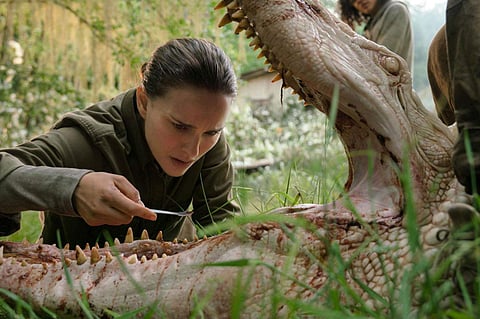

In Steven Spielberg's Jurassic Park - a film that celebrates life and evolution like no other - Dr Ian Malcolm, immortalized by Jeff Goldblum on screen, delivers a warning in no uncertain terms about what the park's scientists are attempting - "If there is one thing the history of evolution has taught us it's that life will not be contained. Life breaks free, it expands to new territories and crashes through barriers, painfully, maybe even dangerously." The catchphrase "life finds a way" forms the science and philosophy of Spielberg's film. In Alex Garland's new film, Annihilation, too, life finds a way. But Garland focuses on the painful part, the dangerous part of that line. Some of the first visuals we see are of cells mutating. One becomes two, two becomes four. During an early scene, we hear the song Helplessly Hoping by Crosby, Stills & Nash that has lyrics that go - "They are one person, they are two alone, they are three together, they are four for each other." Lena (Natalie Portman) is alone. Her husband Kane (Oscar Isaac), a soldier, has been missing for almost a year. Then he returns. He is somehow not whole. What happened to him?
Cast: Natalie Portman, Jennifer Jason Leigh, Tessa Thompson, Gina Rodriguez
Director: Alex Garland
Lena is a biologist at Johns Hopkins. When we first see her, she is talking about tumors and cervical cancer. We also see her reading The Immortal Life of Henrietta Lacks, the same Lacks whose cervical cancer cells were biopsied (at Johns Hopkins Hospital) and formed the immortal cell line, HeLa, used in research. Birth, rebirth and immortality form the major themes of Annihilation, a counter-intuitive undertaking considering it means destruction. But life and death, beauty and abomination, freedom and danger, coexist in Garland's world, a world created out of the book by Jeff VanderMeer. Lena, along with physicist Josie (Tessa Thompson), paramedic Anya (Gina Rodriguez), geologist Cass (Tuva Novotny) and Dr Ventress (Jennifer Jason Leigh), a psychologist, enters The Shimmer, as the region is called, only to find it arresting and beautiful, populated by distinct flora and fauna, a riot of colours battling for attention. Garland makes it look stark and the way he uses light, the greens are bright and the hues on flowers and plants accentuate to make The Shimmer look like a wonderland. A wonderland where life follows a different set of rules and at times, hangs in the balance. The remains of a phosphorous grenade sit in inertia, all soot but maintaining form and balance against a white backdrop. A psychedelic image exists in three dimensions, with a skull and torso sprouting out of malformed but colourful growth under which rests the man's legs. The individual images from Annihilation could make for avant-garde art installations.
The expedition plot makes Annihilation feel like a companion piece to Tarkovsky's Stalker. But where Stalker can be visually bleak and gorgeous at every turn, Annihilation has lush outlook all along, bleak only when it is screaming for life, in a place where life glows and combusts at equal rate. Annihilation does carry the weight of cancer on its shoulders, but unlike Stranger Things, another recent work with cancer allegory whose Upside Down was a dark, surreal wasteland, Annihilation's Shimmer is fertile, sunlit and full of life. We know Lena returned from the expedition because the film cuts between The Shimmer and Lena's debriefing, where she says not everything was nightmarish, that The Shimmer held things that were elegant too. The meaning of Annihilation - don't forget the trademark symbol next to it - might be the biggest talking point, but Garland's visual grammar is quite the puzzle. Josie makes a startling discovery about the science of The Shimmer, which fascinates and frightens them at the same time. When they (and us) are taking it in, the surrounding is an eye-popping postcard, and it makes you wonder if Garland's playful experiments with light throughout the film has anything to do with the discovery. Or with that early scene with Lena and Kane where Garland films their hands, held on a table across from each other, through a glass filled with water.
Is it possible to talk about Annihilation without a word about its international release on Netflix, robbing everyone of a big screen experience? Alex Garland, reportedly, was furious with the studio (Paramount) and it is not difficult to see why. Annihilation packs a potent allure, a guaranteed visual spectacle in the theatres. It also boasts of a diverse cast, a for-all-purposes all-women cast. It is also not tokenism. Five women, with medical and science degrees, go on an expedition to examine life, in a movie about birth and death. Late in the film, Lena, during her debriefing, is sure The Shimmer wasn't harmful. She wonders that it was probably trying to change something. Annihilation may not be epoch-making but it is another small step towards positive change. A big screen splash would have made for a rousing welcome.